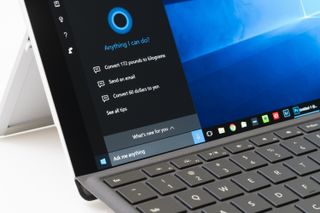Report: Microsoft Contractors Hear Skype, Cortana Recordings

Updated, 8/9/19, 11:10am PT: Microsoft responded to our request for comment with the same statement it sent to Motherboard earlier this week. The company declined to answer further questions about not explicitly informing users their voice recordings might be shared with outside contractors, how it removes personally identifiable information from these recordings, or if it's planning to make any changes to these processes following the revelations from Motherboard's report. We'll continue to monitor the situation to see if Microsoft releases additional information or regulators expand their inquiries into how tech companies handle voice recordings to include Skype Translate and Cortana.
Original article, 8/7/19, 8:32am PT:
Microsoft became the latest tech company to face criticism for having people listen to ostensibly private conversations today, with Motherboard reporting that contractors help train AI using snippets of audio recorded via the Translate feature in Skype, as well as the Cortana voice assistant.
The report was based on information provided by an anonymous Microsoft contractor, who told Motherboard that "some stuff I've heard could clearly be described as phone sex." He also said workers have "heard people entering full addresses in Cortana commands, or asking Cortana to provide search returns on pornography queries." Motherboard also received internal documents, screenshots and audio recordings backing up these claims.
Microsoft is vague about the fact that contractors might listen to audio recordings in its marketing, support documents and privacy policies. The company discloses that it can "analyze" some audio to improve its AI but doesn't explicitly state what that analysis involves. Some people might assume that other AI is being used to double-check existing tools and may not have even considered the possibility of another person listening in.
We reached out to Microsoft for comment in response to Motherboard's report and will update if the company responds. In the meantime, here's the statement it sent Motherboard, which makes it seem like the company doesn't plan to change its handling of audio recordings any time soon:
"Microsoft collects voice data to provide and improve voice-enabled services like search, voice commands, dictation or translation services. We strive to be transparent about our collection and use of voice data to ensure customers can make informed choices about when and how their voice data is used. Microsoft gets customers’ permission before collecting and using their voice data. [...] We also put in place several procedures designed to prioritize users’ privacy before sharing this data with our vendors, including de-identifying data, requiring non-disclosure agreements with vendors and their employees, and requiring that vendors meet the high privacy standards set out in European law. We continue to review the way we handle voice data to ensure we make options as clear as possible to customers and provide strong privacy protections."
Stay on the Cutting Edge
Join the experts who read Tom's Hardware for the inside track on enthusiast PC tech news — and have for over 25 years. We'll send breaking news and in-depth reviews of CPUs, GPUs, AI, maker hardware and more straight to your inbox.
Not Again...
This practice isn't--or at least wasn't--limited to Microsoft. Bloomberg reported on Amazon contractors listening to recordings from Alexa in April, VRT NWS reported on similar practices at Google in July and The Guardian followed up a few weeks later, reporting that Apple contractors listened to Siri recordings. Many of the AI-powered services that have become increasingly popular over the last few years were backed up by human workers.
The Hamburg Commissioner for Data Protection and Freedom of Information announced on August 1 that it was investigating Google's use of these contractors to improve the AI in Google Assistant. The regulator told Google not to use real-world recordings in this way for at least three months. It mentioned Amazon and Apple in the announcement, too, which meant Google may not be the only company at risk of legal scrutiny.
Amazon and Apple quickly responded to backlash caused by these revelations. Amazon said on August 2 that it would give Alexa users the option to keep recorded audio snippets private, and that same day, Apple said it was temporarily suspending its program while it conducted a thorough review. The default for both services is still potentially invasive, but at least their users will have the option to keep their audio recordings private.

Nathaniel Mott is a freelance news and features writer for Tom's Hardware US, covering breaking news, security, and the silliest aspects of the tech industry.
-
Math Geek not really even newsworthy anymore. folks seem to have just accepted all this into their lives and don't even give it a second thought anymore.Reply
makes me sad really
:sad: -
spiketheaardvark As much I like the idea of voice interation with technology, I'd really prefer it be processed locally. Does voice recognition really need to be processed in the cloud?Reply -
Math Geek considering AI needs a lot of processing power, i don't think it will ever be done locally. you can't pack enough power into your cellphone or pc to handle the needs.Reply
i understand this has to be done in the cloud, but this does not mean, that you should have to give up all privacy expectations to use the service. something like skype though, i don't see any need for there to be any type of record much less it being use like this. that's plain old "cause we can" abuse in my opinion. -
spiketheaardvark I'm not sure that I buy the fact that the voice recognition requires vast amounts of processing. Windows 95 came with a basic speech to text function (though it admittedly sucked) but my 3 year old SSD has more processing power than that machine did. Also my understanding is that the recognition of the initiation command such as "okay google", "siri", "echo" is done locally on the device, and google is trying to do the voice recognition locally on their pixel phones to improve response time.Reply
I do concede that the databases needed to turn commands into actions will likely remain outside of the scale of home computing for some time. But if the CPU time needed was astronomically high it would cost something.
Privacy policies are nice(and US law could use some serious updating) but I'm alway suspicious of other peoples computers. -
USAFRet It not just the (substantial) processing power, but also training the AI.Reply
Something was said, Cortana/Alexa/Echo/Siri acted.
Did they get it right?
To know the answer, some human has to listen and evaluate.
"Hey, look at that puppy on the tables...awww..."
Is a whole lot different than
"Hey, look at that puppy on the table saw." -
DookieDraws So, um, they only listen to audio recordings, right? I mean, they don't look at Skype video recordings, do they? Pfffft, not worried or anything, just curious is all. I mean, they don't record our video chats or anything, right? They can't see our video chats and stuff, can they? Not worried or anything, just find it kind of odd is all. Can they see them? Come on, guys. Quit joking around.Reply -
alextheblue Replylisten to ostensibly private conversations today
On a Windows 10 install / first boot on an OEM machine (all recent revisions) you have to go through a privacy page and OK this stuff. You can opt out of this stuff at that time, or at any time later. So there's that.
So the Cortana part is already obvious. But if you read carefully you'll notice the Skype part relates to the AI-powered translate feature of Skype. So it's done for the same reasons, they're testing and improving translation.Math Geek said:i understand this has to be done in the cloud, but this does not mean, that you should have to give up all privacy expectations to use the service. something like skype though, i don't see any need for there to be any type of record much less it being use like this. that's plain old "cause we can" abuse in my opinion.
Either way, see above. If you're opted in and you want out, you can do so. Now, if you're using an Android device, your control is both more limited and their track record is pretty poor. That's why I ended up with an iPhone after I finally wore out my Lumia. Never thought I'd see the day I used an Apple device. The UI is pretty weak but it does phone things and runs the few apps I care about. I replaced/deleted a bunch of stock apps, I use Outlook and OneDrive just for two examples. Oh and apparently iOS 13 finally adds dark mode. Heh...
Stock alarm app is kind of primitive, it fires up the audio at 100% immediately. I got used to the one on W10M starting off quiet and gradually raising the volume. Might have to find an alternative alarm app. -
DemonicSky Here's some nice info in case you missed it.Reply
Any private message on Microsoft's forum is readable by any of their contractors. The same goes with any incoming or outgoing mail you send from Outlook.
And contractors in this case, are minimum wage workers, often straight out of school with nonexistent or minimum security checks before being hired.
Most Popular



